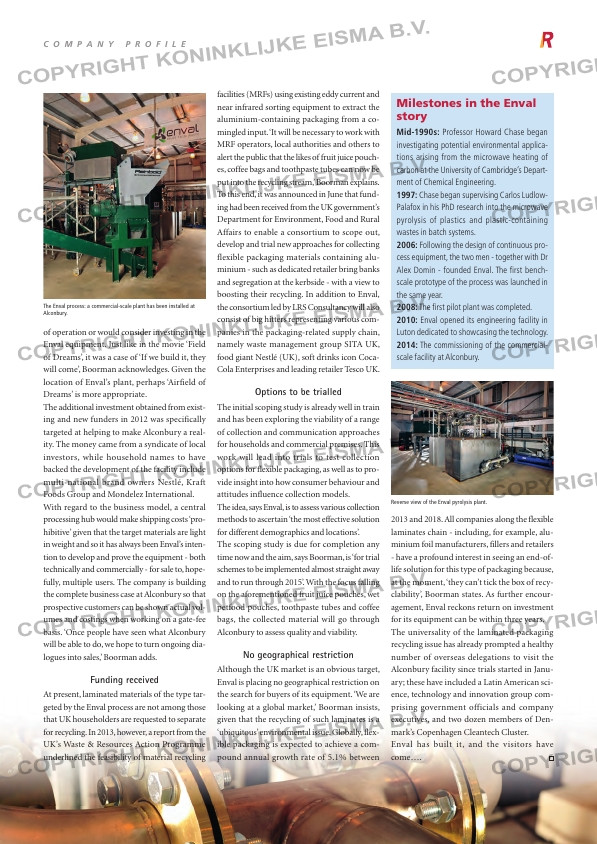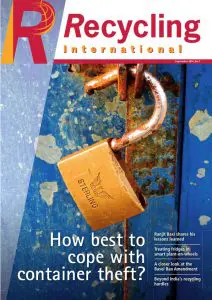Page 55 from: September 2014

55September 2014
C O M P A N Y P R O F I L E
of operation or would consider investing in the
Enval equipment. Just like in the movie ‘Field
of Dreams’, it was a case of ‘If we build it, they
will come’, Boorman acknowledges. Given the
location of Enval’s plant, perhaps ‘Airfield of
Dreams’ is more appropriate.
The additional investment obtained from exist-
ing and new funders in 2012 was specifically
targeted at helping to make Alconbury a real-
ity. The money came from a syndicate of local
investors, while household names to have
backed the development of the facility include
multi-national brand owners Nestlé, Kraft
Foods Group and Mondelez International.
With regard to the business model, a central
processing hub would make shipping costs ‘pro-
hibitive’ given that the target materials are light
in weight and so it has always been Enval’s inten-
tion to develop and prove the equipment – both
technically and commercially – for sale to, hope-
fully, multiple users. The company is building
the complete business case at Alconbury so that
prospective customers can be shown actual vol-
umes and costings when working on a gate-fee
basis. ‘Once people have seen what Alconbury
will be able to do, we hope to turn ongoing dia-
logues into sales,’ Boorman adds.
Funding received
At present, laminated materials of the type tar-
geted by the Enval process are not among those
that UK householders are requested to separate
for recycling. In 2013, however, a report from the
UK’s Waste & Resources Action Programme
underlined the feasibility of material recycling
Milestones in the Enval
story
Mid-1990s: Professor Howard Chase began
investigating potential environmental applica-
tions arising from the microwave heating of
carbon at the University of Cambridge’s Depart-
ment of Chemical Engineering.
1997: Chase began supervising Carlos Ludlow-
Palafox in his PhD research into the microwave
pyrolysis of plastics and plastic-containing
wastes in batch systems.
2006: Following the design of continuous pro-
cess equipment, the two men – together with Dr
Alex Domin – founded Enval. The fi rst bench-
scale prototype of the process was launched in
the same year.
2008: The fi rst pilot plant was completed.
2010: Enval opened its engineering facility in
Luton dedicated to showcasing the technology.
2014: The commissioning of the commercial-
scale facility at Alconbury.
facilities (MRFs) using existing eddy current and
near infrared sorting equipment to extract the
aluminium-containing packaging from a co-
mingled input. ‘It will be necessary to work with
MRF operators, local authorities and others to
alert the public that the likes of fruit juice pouch-
es, coffee bags and toothpaste tubes can now be
put into the recycling stream,’ Boorman explains.
To this end, it was announced in June that fund-
ing had been received from the UK government’s
Department for Environment, Food and Rural
Affairs to enable a consortium to scope out,
develop and trial new approaches for collecting
flexible packaging materials containing alu-
minium – such as dedicated retailer bring banks
and segregation at the kerbside – with a view to
boosting their recycling. In addition to Enval,
the consortium led by LRS Consultancy will also
consist of big hitters representing various com-
panies in the packaging-related supply chain,
namely waste management group SITA UK,
food giant Nestlé (UK), soft drinks icon Coca-
Cola Enterprises and leading retailer Tesco UK.
Options to be trialled
The initial scoping study is already well in train
and has been exploring the viability of a range
of collection and communication approaches
for households and commercial premises. This
work will lead into trials to test collection
options for flexible packaging, as well as to pro-
vide insight into how consumer behaviour and
attitudes influence collection models.
The idea, says Enval, is to assess various collection
methods to ascertain ‘the most effective solution
for different demographics and locations’.
The scoping study is due for completion any
time now and the aim, says Boorman, is ‘for trial
schemes to be implemented almost straight away
and to run through 2015’. With the focus falling
on the aforementioned fruit juice pouches, wet
petfood pouches, toothpaste tubes and coffee
bags, the collected material will go through
Alconbury to assess quality and viability.
No geographical restriction
Although the UK market is an obvious target,
Enval is placing no geographical restriction on
the search for buyers of its equipment. ‘We are
looking at a global market,’ Boorman insists,
given that the recycling of such laminates is a
‘ubiquitous’ environmental issue. Globally, flex-
ible packaging is expected to achieve a com-
pound annual growth rate of 5.1% between
2013 and 2018. All companies along the flexible
laminates chain – including, for example, alu-
minium foil manufacturers, fillers and retailers
– have a profound interest in seeing an end-of-
life solution for this type of packaging because,
at the moment, ‘they can’t tick the box of recy-
clability’, Boorman states. As further encour-
agement, Enval reckons return on investment
for its equipment can be within three years.
The universality of the laminated packaging
recycling issue has already prompted a healthy
number of overseas delegations to visit the
Alconbury facility since trials started in Janu-
ary; these have included a Latin American sci-
ence, technology and innovation group com-
prising government officials and company
executives, and two dozen members of Den-
mark’s Copenhagen Cleantech Cluster.
Enval has built it, and the visitors have
come….
Reverse view of the Enval pyrolysis plant.
The Enval process: a commercial-scale plant has been installed at
Alconbury.
RI-7 Enval.indd 55 28-08-14 16:56



